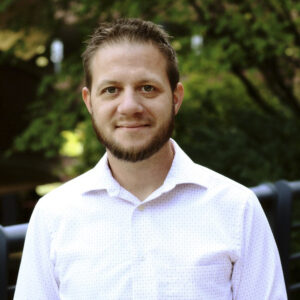Keith Christie, PsyD is an instructor teaching Assessment in the MA program.

Where did you grow up?
I was born in Southwest Detroit. I moved to Livonia for grade school and to the Irish Hills in Michigan from 6-9th grade. I then moved to Ohio, where I finished high school.
What or who influenced you to study psychology?
I started college as a business major and was automatically enrolled in Psych 101. I took an interest in psychology and made it my minor until the end of my sophomore year, when I began double majoring in psychology and business administration. My business classes were teaching me to see people as wallets and devise ways to take as much for myself as possible. I find more meaning in seeing people as people and helping others reach their potential. It is amazing to be part of the power of the therapeutic process. There are few things more satisfying than meeting people at their worst and watching them grow into the best version of themselves. Being a part of significant change in individuals, communities, and culture is what drives my passion.
What are your research and/or clinical interests?
My interests are boys/men’s mental health, chronic health/pain problems, severe mental illness, and school violence.
What appeals to you most about teaching at MSP?
The humanistic focus, smaller school/class sizes, and preparing future clinicians who can make a difference all appealed to me.
What is your favorite non-academic book and why?
Man’s Search for Meaning by Viktor Frankl. I’m not much of a pleasure reader, but read more for learning and personal growth. I find inspiration in the stories he presents and a deeper understanding of what it means to be human.
What advice would you like to share with incoming or current students?
Graduate school can be very challenging, but with those challenges come significant opportunities for personal and professional growth. Stay curious and flexible, and you will find your way. Use all the help and resources available to you. Get to know your faculty and develop relationships with your professors. Make sure you have a strong support system and USE it. Remember to love yourself through the process with self-care and time away from academics regularly.